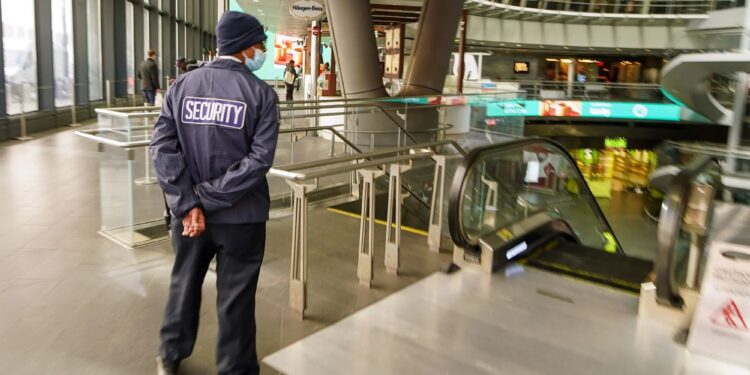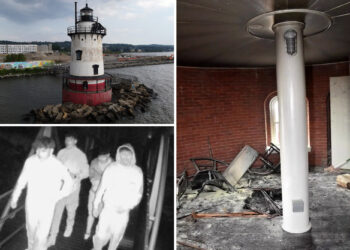
Every New Yorker knows the pleasure of shopping for luxury items such as socks, toothpaste, or an energy drink, only to find these once-easily accessed goods now locked up behind plexiglass.
“Convenience” stores are anything but convenient when you have to ask the shop’s sole clerk to leave the cash register to unshackle the string cheese.
Rampant shoplifting has now led global shopping-mall giant Westfield to break its lease on its Fulton Center location in lower Manhattan.
The MTA, which owns the site, has filed suit to prevent Westfield from ducking out.
The underground mall/subway station was opened to great fanfare less than a decade ago, with then-gov Andrew Cuomo fulsomely promising it would “spur a resurgence” in the area. He was half right, if he meant a resurgence in constant petty crime, quality of life issues, and vandalism.
Store managers in the complex even report that tip jars are routinely stolen.
New York City’s pro-crime lobby — urbanists, “Defunders,” transit die-hards — have leapt to defend the MTA, possibly the first time the hipster Left has taken the landlord’s side in a lease dispute.
They claim that Westfield is using the myth of urban crime as cover for their own failure to attract and retain quality tenants.
This is a common theme lately, as retailers shutter stores due to the cost of “shrinkage” — retail-speak for “stealing.” Critics believe that stores are exaggerating the problem of theft and crime in order to achieve the real goal of all retailers — to go out of business.
When Target announced it would close its East Harlem location due to the impossibility of operating it “safely and successfully,” City & State New York editor Ralph Ortega called the chain a “traitor” and demanded it “do more” to help the “neighborhood when it’s desperately needed.”
Ortega echoes the words of congressional “Squad” member Ayanna Pressley, who gave an impassioned speech of outrage on the floor of Congress when Walgreens announced it would close a store in the Roxbury neighborhood of Boston.
The store had been plagued by theft and violence for years, but according to Pressley the corporate actions were part of a broad conspiracy with roots in the darkest aspects of American history.
“These closures are not arbitrary and they are not innocent,” Pressley thundered. “They are life-threatening acts of racial and economic discrimination.”
Similar concerns arose when Macy’s announced it would close its classic San Francisco flagship store on Union Square. Though workers at the department store reported that shoplifting was totally out of control, the boss of their union insisted that crime is “an excuse” to close a famed store in the middle of one of the nation’s richest cities.
Advocates of criminal justice “reform” — fewer cops, fewer arrests, and ultimately no prisons — insist that law-and-order hawks overstate the shoplifting epidemic to spread fear and reimpose tougher policing and sentencing practices.
They insist that shoplifting is driven by need. Squad leader and Bronx congresswoman Alexandria Ocasio-Cortez has made this point repeatedly.
In 2020, at the beginning of the COVID lockdown, AOC was widely ridiculed for claiming that thieves “go out and they need to feed their child and they don’t have money . . . They are put in a position where they feel like they need to shoplift some bread or go hungry that night.”
A few years later, after the NYPD broke up a ring of Bronx shoplifters, AOC decried the “violent conditions” of capitalist society, explaining that “our politics and economic priorities create conditions where people steal baby formula to survive.”
But nobody in New York steals baby formula because their baby is starving. The WIC program offers free baby formula to low-income mothers, and formula is also SNAP-eligible.
To get a better picture of what organized shoplifting is like, look at the case of Michelle Mack, the San Diego housewife who was just arrested for running a ring of makeup thieves.
This Fagin-in-Ferragamos managed a gang of “girls” who roamed the country stealing high-end cosmetics, which Mack then sold at a steep discount from her Amazon store.
Authorities say Mack’s illegal enterprise was worth millions. That’s a lot of baby formula.
Critics say that there’s no national epidemic of shoplifting, and they are mostly correct. It’s a major problem in a handful of cities, which happen also to be the places where the five-finger discount has been effectively decriminalized.
New York City, San Francisco, Chicago, and other “Progressive” jurisdictions have decided that they aren’t going to prosecute “low-level” crime. And — surprise! — they have a lot more of it.
Until the consequences for theft are restored, don’t count on local stores to take down the plexiglass anytime soon. You’ll have to have your deodorant unlocked until “reform” ends.
Seth Barron is managing editor of The American Mind.



























